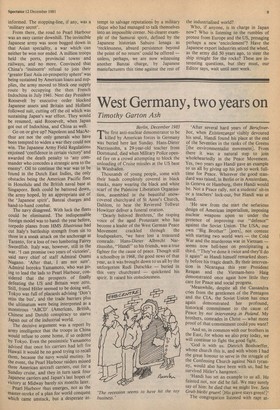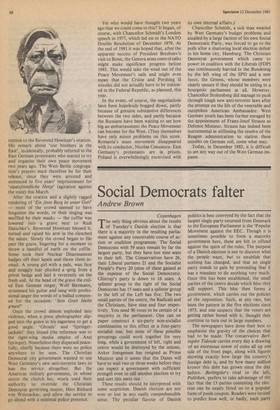West Germany, two years on
Timothy Garton Ash
Berlin, December 1983
The first anti-nuclear demonstrator to be killed by American forces in Germany was buried here last Sunday. Hans-Dieter Narzisssohn, a 29-year-old teacher from Dortmund, died when Military Police opened fire on a crowd attempting to block the unloading of Cruise missiles at the US base in Wiesbaden.
Thousands of young people, some with their heads completely covered in black masks, many wearing the black and white scarf of the Palestine Liberation Organisation, assembled in the beautiful snowcovered churchyard of St Anne's Church, Dahlem, to hear the Reverend Tollwut Howitzer deliver a funeral oration.
'Dearly beloved Brethren,' the rasping voice of the aged Protestant who has become a leader of the West German Peace Movement crackled through the loudspeakers, 'we have lost a treasured comrade. Hans-Dieter Albrecht Narzisssohn, "Handi" to his friends, was a true fighter for the cause of peace. Though still a schoolboy in 1968, the good news of that year, as it was brought down to us all by the unforgotten Rudi Dutschke — buried in this very churchyard — quickened his spirit. It raised his consciousness. 'After several hard years of Berufsverbot, when Eadstenzangst visibly devoured his soul, Handi found his place at the end of the Seventies in the ranks of the Greens [the environmentalist movement]. From there it was a natural step to join wholeheartedly in the Peace Movement. Yes, two years ago Nandi gave an example to us all by giving up his job to work fulltime for Peace. Wherever the good standard was raised, in Berlin or in Amsterdam, in Geneva or Hamburg, there Handi would be. Not a Peace rally, not a students' sit-in or a teachers' lock-out, but Handi was at hand.
'He saw from the start the nefarious design of American imperialism, imposing nuclear weapons upon us under the pretence of improving our "defence" against the Soviet Union. The USA, our own "Big Brother" [jeers], not content with starting two world wars — the Cold War and the murderous war in Vietnam — seems now hell-bent on precipitating a third. "They've done it twice and they'll do it again" as Handi himself remarked shortly before his tragic death. By their intervention in Nicaragua this year President Reagan and the Vietnam-hero Haig demonstrated once again how little they care for Peace and social progress. 'Meanwhile, despite all the Cassandra cries from the gentlemen of the Pentagon and the CIA, the Soviet Union has once again demonstrated her profound, historical commitment to the cause of Peace by not intervening in Poland. My brothers, comrades in Christ — what more proof of that commitment could you want?
'And so, in common with our brothers in the East, for whom we also pray today, we will continue to fight the good fight. `God is with us. Dietrich Bonhoeffer, whose church this is, and with whom I had the great honour to serve in the struggle of the Confessing Church against Nazi tyranny, would also have been with us, had he survived Hitler's hangmen. :Handi has set an example to us all. He fainted not, nor did he fail. We may surely say of him: he died that we might live. Sein Grab bleibt gruen! [His grave stays green!]' The congregation listened with rapt at tention to the Reverend Howitzer's oration. His remark about 'our brothers in the East', incidentally, probably referred to the East German protestants who started to try and organise their own peace movement two years ago. The West Berlin congregation's prayers must therefore be for their release, since they were arrested and sentenced to five years' imprisonment for `staatsfeindliche Hetze' (agitation against the state) this March.
After the oration and a slightly ragged rendering of `E'in feste Burg ist unser Gott' — most of the crowd seemed to have forgotten the words, or their singing was muffled by their masks — the coffin was lowered into a grave next to Rudi Dutschke's. Reverend Howitzer blessed it, turned and raised his arm in the clenched fist salute. Slowly the crowd began to file past the grave, lingering for a moment to throw a handful of earth on the coffin. Some took their Nuclear Disarmament badges off their lapels and threw them instead. A young girl with a pale, wan face and straggly hair plucked a sprig from a privet hedge and laid it reverently on the fresh soil. At the head of the grave the exiled East German singer, Wolf Biermann, strummed his guitar and sang with professional anger the words of a ballad composed for the occasion: Sein Grab bleibt gruen!'
Once the crowd almost exploded into violence, when a press photographer slipped into the grave in his eagerness to get a good angle. 'Ghouls' and 'Springerjackals!' they hissed (the reference was to the right-wing media empire of Axel Springer). Nonetheless they dispersed peacefully, chiefly because there were no police anywhere to be seen. The Christian Democrat city government wanted to use West Germany's new anti-terrorist laws to ban the service altogether. But the American military government, in whose sector the church lies, wisely used their authority to override the Christian Democrat governing mayor, Herr Richard von Weizsacker, and allow the service to go ahead with a minimal police presence. Yet who would have thought two years ago that we could come to this? It began, of course, with Chancellor Schmidt's London speech in 1977, which led on to the NATO Double Resolution of December 1979. At the end of 1981 it was hoped that, after the apparent success of President Brezhnev's visit to Bonn, the Geneva arms control talks might make significant progress before 1983. This would take the wind out of the Peace Movement's sails and might even mean that the Cruise and Pershing II missiles did not actually have to be stationed in the Federal Republic, as planned, this year.
In the event, of course, the negotiations have been hopelessly bogged down, partly because of genuine substantive differences between the two sides, and partly because the Russians have been waiting to see how big an embarrassment the Peace Movement can become for the West. (They themselves have only minor problems on this score. Romania's mass movement disappeared with its conductor, Nicolae Ceausescu. East Germany's protestants are in prison. Poland is overwhelmingly excercised with its own internal affairs.) Chancellor Schmidt, a sick man wearied by West Germany's budget problems and assailed by a large faction of his own Social Democratic Party, was forced to go to the polls after a shattering local election defeat in his home city, Hamburg. The Christian Democrat government which came to power in coalition with the Liberals (FDP) was continuously harried in the Bundestag by the left wing of the SPD and a new force, the Greens, whose members were clearly unsure if they should be sitting in a bourgeois parliament at all. However, Chancellor Stoltenberg did manage to push through tough new anti-terrorist laws after the attempt on the life of the venerable and outspoken American Ambassador. West German youth has been further enraged by the appointment of Franz-Josef Strauss as Defence Minister. Strauss has indeed been instrumental in stiffening the resolve of the Reagan administration to station these missiles on German soil, come what may.
Today, in December 1983, it is difficult to see any way out of the West German impasse.







































 Previous page
Previous page